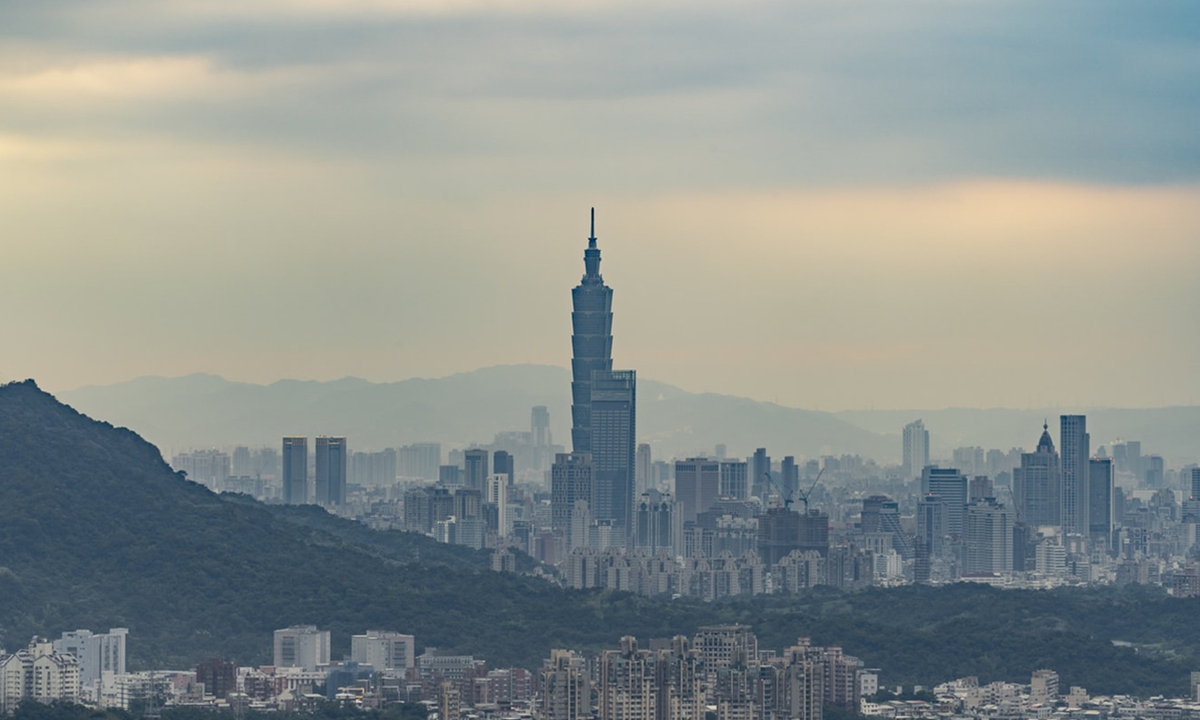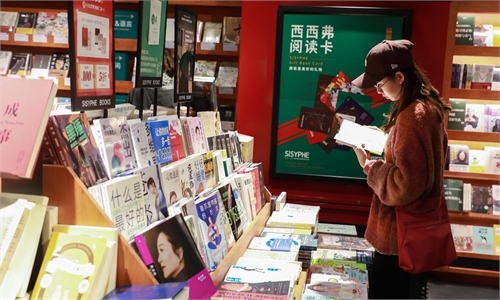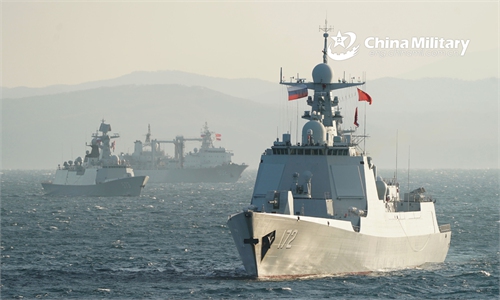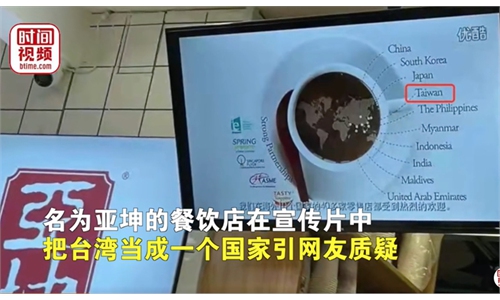EU, US send wrong signals on Taiwan, risking miscalculation
‘Dangerous chorus’ only prompts tougher response from mainland

Taiwan Photo: Unsplash
With EU lawmakers pushing forward a resolution in deepening so-called "political and economic ties" with the island of Taiwan and the Biden administration's pick for ambassador to China vowing to make the island "a tough nut to crack," some European and US politicians have continued sending the wrong signals on the Taiwan question, creating a false image of West-led pressure on the Chinese government at a time when tensions have been rising in the Taiwan Straits.
Although the latest resolution adopted by the European Parliament on Thursday is non-binding, some experts warned that such wrongdoings on the Taiwan question could be echoed by EU member states, which may make further miscalculations on the matter like Lithuania did.
Regarding the latest remarks of US ambassador to China nominee Nicholas Burns on the Taiwan question before the Senate Foreign Relations Committee on Wednesday, calling the Chinese government "aggressive" and emphasizing the US commitment to the island, some experts consider such ambiguity a reflection of the Biden administration's overall China policy, which should instead stop playing the Taiwan card to challenge the Chinese government's bottom line and core interests.
They believe that this US career diplomat won't make any major breakthrough in China-US relations, however, any further provocation by playing the Taiwan card will only prompt a tougher response from the mainland, experts and officials warned.
Dangerous 'chorus'
The European Parliament adopted a resolution on Thursday to intensify relations between the EU and the Taiwan island, urging the European Commission, the bloc's executive body, to begin an "impact assessment, public consultation and scoping exercise" for an EU-Taiwan Bilateral Investment Agreement (BIA), according to a statement on the parliament's website.
It has become an adopted resolution after some members of European Parliament(MEPs) sought to upgrade ties with the island in September, and with the resolution passed, they also proposed to change the name of the European Economic and Trade Office in Taiwan to "European Union Office in Taiwan."
Some pro-Taiwan MEPs suggested early this year the name-changing scheme in an attempt to achieve political functions of the office, which is a serious violation of international laws and the purpose of the UN, according to Chinese officials and experts.
Given its active role in expanding the scope of anti-China voices and challenging China's bottom line on the Taiwan question, the European Parliament has been seeking to influence EU decision-making. However, there's no condition for those moves to become concrete policies, noted Cui Hongjian, director of the Department of European Studies at the China Institute of International Studies.
"After China reciprocated EU sanctions over human rights issues, the European Parliament has been playing a so-called victim mentality, voicing support for countries like Lithuania, which have repeatedly provoked on China-related issues," Cui told the Global Times on Thursday.
One of the most important reasons that Taiwan specifically matters for the EU is because the semiconductors produced by Taiwan Semiconductor Manufacturing Company (TSMC) accounts for one-third of the global total, according to Wang Yiwei, director of the institute of international affairs at the Renmin University of China in Beijing.
The "dialogue and cooperation with Taiwan in all industrial sectors and supply chains...such as semiconductor technologies" was particularly noted in the EU-Taiwan Political Relations and Cooperation Report adopted by the European Parliament.
"The differences in ideology and values between China and the EU are just a pretext while what really matters to the bloc are the cooperation on industrial and digital fields with Taiwan as well as the all-around pressure from China, as the EU has labeled China a systemic rival," Wang said.
Although the latest resolution will have no substantial impact on EU policies on the Taiwan question, Cui warned that such a dangerous chorus could lead more member states like Lithuania to make miscalculation on the core interests of China.
Both the Mission of China to the EU and Chinese Foreign Ministry denounced the parliament's Taiwan-related report, as such a document blatantly advocates so-called "political relations" with the island, which severely violates the one-China principle.
While the mission has lodged solemn representations with the EU, the foreign ministry urged relevant parties not to underestimate the strong resolve, determination and capability of the Chinese people in safeguarding national sovereignty.
The Foreign Affairs Committee of the National People's Congress, China's top legislature, demanded that the EU parliament immediately correct its wrong words and actions, pointing out that the position paper on the island of Taiwan it adopted will seriously damage the foundations of China-EU relations, according to a public statement on Thursday.
Some EU lawmakers continued to play the Taiwan card ahead of a planned visit by Joseph Wu, head of the external affairs authority of Taiwan, to Eastern Europe next week while the Inter-Parliamentary Alliance on China, which brings together radical anti-China lawmakers in Western countries, reportedly invited Wu to a "counter-meeting" ahead of the G20 Leaders Summit in Rome at the end of the month.
The DPP authorities' collusion with some foreign legislators to concoct various bills related to Taiwan, and attempt to rely on external forces to carry out secessionist activities will fail, warned the spokesperson of the Taiwan Affairs Office of State Council on Thursday, expressing strong dissatisfaction and opposition to the position.
While anti-China forces try to create a false image of rising concerns in the West over the Taiwan question, they won't be able to make fundamental changes to the status quo, according to some experts. Burns' tough stance on China was believed to echo a consensus in the US toward China, which, in the eyes of some experts, is a watered-down version of the US' "Taiwan porcupine strategy."
Mixed signals
Burns said during a session on Wednesday at the US Senate that "China was aggressive and untrustworthy," insisting that the US should boost the island's defenses against the so-called threat from the mainland, which should also be a priority of the US government, according to media reports. The career diplomat also claimed that the US is responsible for making the island "a tough nut to crack," citing the PLA's intensified military drills in the Taiwan Straits in recent weeks.
"Those claims generally reflected the current US government's China policy, as Burn's comments did not deviate from the current security and foreign policy framework designated by the Blinken-Sullivan team," Lü Xiang, a research fellow at the Chinese Academy of Social Sciences in Beijing, told the Global Times on Thursday.
When he said China is not trustworthy, there's some ambiguity on that, as he did not mention whether he can't believe in the mainland having the ability to achieve peaceful reunification or using military power when it's necessary, Lü noted.
Wang Wenbin, spokesperson of the ministry, told a routine press conference on Thursday that Burns' remarks are full of a Cold War and zero-sum mentality. We urge Burns to have an objective understanding of China's actual situation, view China's development and China-US relations in a rational way and never underestimate the strong determination of the Chinese people to defend their rights, the Chinese official said.
While Burns expects the island to become a tough nut to crack, Lü believes that it's the same as the "Taiwan porcupine strategy" as some American strategists advocated, but a milder version. "If the US further raises military assistance to the island--it may provide medium- and long-range missiles to the island--the mainland will take strong countermeasures," he said.
Chinese experts said they do not expect a sudden turning point in China-US relations when the new ambassador assumes office. "Still, it's better to have more communication channels than nothing," Lü said.




